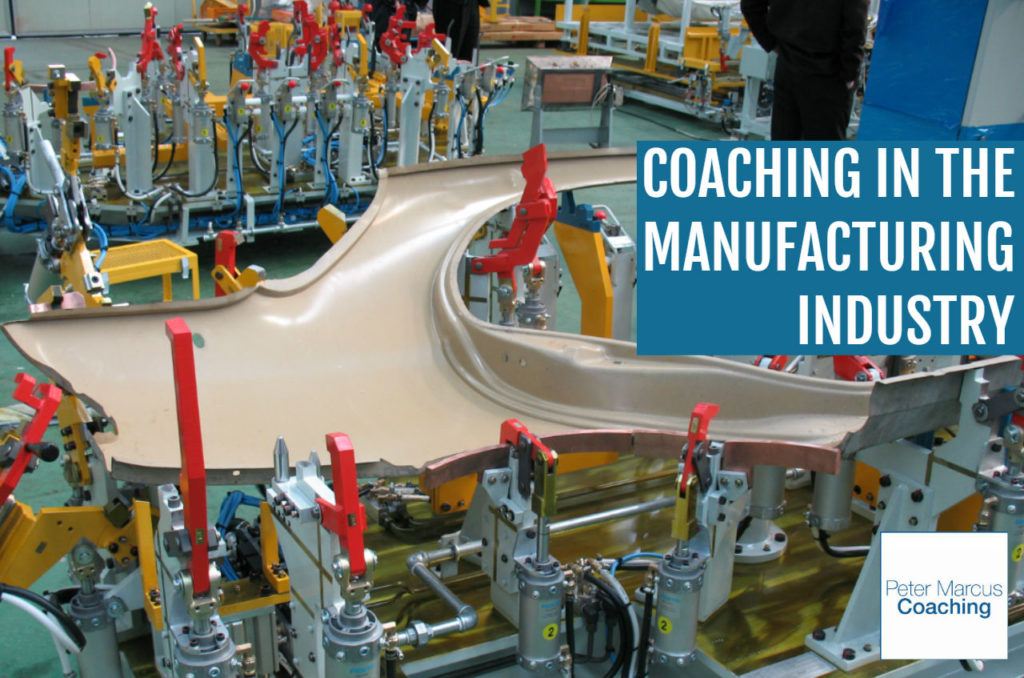How is coaching utilized in the manufacturing industry?

Different industries call for different manifestations of coaching, both in-house and external. Both internal and external coaches have their perks and drawbacks. This is especially true in large industries with thousands of employees working under a single company, such as manufacturing.
Manufacturing is highly competitive and subject to fluctuations. This calls for a need for a distinctive type of coaching—one that helps promote security and stability in a volatile environment.
Coaches create strength in business
Employees want to feel secure in their jobs and in their own capabilities. Managers and leaders want to feel secure that the business is moving forward at a steady, consistent rate. In an uneasy manufacturing market, employees and managers both need some sort of guidance to institute stability. This is where the business coach steps in.
Coaches assist with various challenges in large and small industries:
- Developing new skillsets in employees and leaders
- Challenging and supporting personnel
- Building corporate experience and culture
- Resolving issues and conflict
- Initiating conversations and dialect
- Managing transitions and growth
There are 5 key areas of coaching for established businesses in the manufacturing industry: Business planning and strategy, enhancing client base and profitability, promoting core values, managing integrations and industry standards, and boosting scalability. Let us explore these areas.
1. Business planning and strategy
In an uncertain market, businesses find certainty through concrete strategy. Coaches can help provide tools for strong business planning through goal-setting, analysis processes, reflection guides, and more. While many leaders have a tendency to focus on the past, coaches push the focus to the present and the future. They utilize and implement tools to create direct, definite, and concrete targets for businesses to strive for.
Nevertheless, as trends and markets shift, strategy must adapt in tandem. Business coaches often act as a guide in these times of upheaval and change.
In times of necessary adjustments, company leaders often look to business coaches to receive the tools that will help them unlock the answers themselves.
How to adapt a strategy:
- Determine the source of the issue or change in your strategy.
- Be honest about the causes and effects of this change.
- Address these issues with the team and company.
- Consider how these issues influence the overall organization and its current strategy.
- Take a look at all your options.
- Use context, previous experience, and team skillsets to determine the correct course of action.
- Implement strategic changes using internal and external resources.
2. Enhancing client base and profitability
In order to grow a business, an owner needs to grow the client base and profitability. Coaches can take you through a series of questions to see where your business is strongest, weakest, and has the greatest room for improvement and development.
The following are some questions to begin such a process:
- How are you spending your time? What do your time management processes look like?
- What are your current costs?
- How do your costs influence the bottom line?
- How do you gain new clients? How do you secure a loyal client-base?
- How does each individual client contribute to your overall profitability?
- What do your employees contribute to the business?
- What do you contribute to the organization’s bottom line?
3. Promoting core values
Think about your business’ core values and how these are aligned with your manufacturing strategy. How do your logistics and operations partners align with your values?
This is especially important for overseas imports. Are your foreign factories and producers working in alignment with your values? If you promote yourself as an environmentally friendly company, do your factories use green practices? If your business fosters a culture of leadership, how does your manufacturer use team building and leadership practices?
For example, in the United States, Apple portrays core values of integrity and advancement opportunities for employees. However, as has been revealed, their factories in China don’t hold this same sort of ethical standard that the Apple team markets to their consumers. This can be damaging to reputation, sales, and client loyalty.
4. Managing integrations and industry standards
The manufacturing industry is fast-paced with new systems and technologies coming out daily.
Consider the industry standards. How are they shifting? How do you keep track of these industry shifts?
Examine industry standards, and how activity in government affects manufacturing and transportation. How does legislation affect the workforce? How will new, pending, or potential laws and regulations influence your manufacturing processes?
Take a look at innovations in your manufacturing sector. How do you stay on top of new systems and technology? How do you integrate tech with your workforce to enhance profitability?
5. Boosting scalability
Scalability is the purpose of manufacturing, and the open global market has opened the doors for a business to expand across the globe. Look at your overall business. Are you local or global? Can you scale in a global market? Or are you choosing to remain local, regional, or national? Why?
With growth comes more money and more activity, but it also brings with it physical and mental challenges for employees and for a business as a whole. Consider whether it would be beneficial for your business to scale up. What will a specific location do for your sales? How will this influence your manufacturing and transportation?
New business coaching
As discussed above, a coach can help you determine 1) an adaptable business plan, 2) the components of profitability, 3) the core values of all business processes, 4) the implementation of technology and industry standards, and 5) potentials for growth and scalability. This is for established companies.
Do you have what it takes to lead a manufacturing business?
A business coach will bring you through the steps to realizing your potential as a manufacturing entrepreneur. Your coach will bring you through the issues of starting a manufacturing business and how you can overcome them. For example, you will need to get legal and logistics protection in order to safeguard your company—and yourself—from liability.
Your coach will also help provide you with resources and relationships that can get you started. The beginning of a business is all about collaboration. Your coach is the first step to building that collective, resource-driven environment for growth.
The BusinessLife Global viewpoint
BusinessLife Global takes a unique approach to the manufacturing industry because of its differences, size, and scope. Nevertheless, key BusinessLife philosophies remain intact:
Owning results: How do you measure your results? What do you do with results? How do you view your results? Remember: results are not good or bad, they are just results.
Accepting growth: What is your plan for growth? How do you set goals to move forward in your strategy? How will you scale your business as growth occurs? Are you prepared to take on new challenges?
Leadership or management: What is your style of direction? Are you a leader? Leaders are transformational (big-picture oriented), autocratic (decision-based), and transactional (results-focused). Or are you a manager? Managers are detail-oriented, project-oriented, and execution-oriented. Managers often have leaders themselves to whom they gravitate for direction.
Working with a BusinessLife Global coaching program involves:
- Sticking to a coaching calendar and timeline
- Creating, reviewing, and meeting key goals and objectives
- Accepting feedback openly
- Reviewing the past and planning for the future
- Using tools and resources
- Communicating with the coach
By engaging in a BusinessLife Global program, you’ll start to see strong outcomes personally and professionally.
Conclusion
There are many benefits of coaching regardless of industry. For large industries like media and manufacturing, the coaching manifestations may change while the core principles and foundations remain. Coaching is highly beneficial for growth and development for established corporations and new business owners in the process of launch.
Wherever your business is, contact Peter today to open up the conversation and find out how your business will value from coaching.


